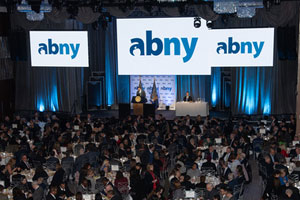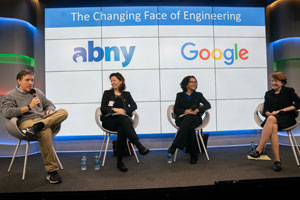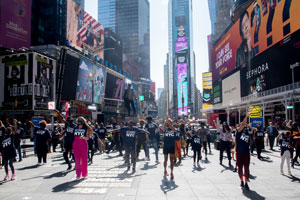March: Women’s History Month
In celebration of Women’s History Month, this March we are highlighting YPs who are fighting for women’s equality and advancement in New York. Congratulations to our March Spotlights, AmintaKilawan-Narine and Jenny Kutner!

Aminta Kilawan-Narine
From a young age, my parents taught me to never forget where I’ve come from. To work hard, but stay humble. All that I’ve accomplished stems from a heartfelt gratitude towards my ancestors, especially my women ancestors, who were trailblazers in their own ways. My maternal grandmother was a seamstress and the single mom of 8. My paternal grandmother sold rice at the local market and was the single mom of 6.
I’m most proud of the birth of my nonprofit organization, South Queens Women’s March (SQWM). I had a vision to create an intersectional movement of women, girls, and gender non-conforming (GNC) people hyper-locally in the communities I live and breathe; that vision has become a reality before my eyes. SQWM was founded right before the pandemic to celebrate the resilience of women, girls, and GNC people in our neighborhoods, in spite of the challenges we face, including gender-based violence. Over the last year, we’ve grown a base of over 50 committed members who have driven our work, stemming from food insecurity and period poverty, to curbing gender-based violence which is on the rise, to promoting equitable access to art, to building political power.
My professional career as a senior legislative attorney budded out of a passion for local politics and a calling to serve New Yorkers. The work requires a commitment to justice and equity and long-term foresight. The legislation I’m tasked with drafting and negotiating must withstand the test of time, and it is an opportunity to promote equity and access for all New Yorkers. I’d recommend critical out-of-the-box thinking for folks who want to pursue my field. And the work isn’t for everyone, so I would recommend finding those with similar positions on LinkedIn and requesting time for coffee (virtual in this world), to learn whether it’s a good fit!
I was born in the Bronx and raised in Queens. Once my family and I moved to Queens (I was 3), I never left the borough except for trips and a brief year after I finished law school to work as an Excelsior Fellow in Albany. I missed Queens every moment I lived in Albany and felt I had left my heart at home. That’s when I realized I couldn’t live without my favorite place on Earth—the crossroads of the world—and it’s when I knew I’d always be a New Yorker, through and through.

Jenny Kutner
I would be nowhere without parents who had the bandwidth and resources to invest in my education, who sacrificed so I could be whoever and whatever I wanted to be. My trajectory was guided by a community of people—family, teachers, friends, occasionally random strangers—who recognized my talents and nurtured my interests. I’ve spent my career thus far trying to marry those talents (writing and public speaking) with those interests (politics, gender equity, and access to opportunity) in pursuit of a more just culture, city, world. After working as a journalist for several years, I completed the Coro Fellowship, which connected me with individuals and organizations doing incredible work across New York City. That’s how I found my way to Hot Bread Kitchen, where I’ve been the Chief of Staff and, more recently, Senior Communications Manager, for over two years.
I’m proud of the way I’ve been able to keep human connection and representation central to my work. Much of my writing has been motivated by saying things that don’t often get said in an effort to validate and align with other people’s experiences—to make people feel they aren’t alone. What that’s looked like at Hot Bread Kitchen is making sure that our members’ voices are not just present in our communications, but that we are giving them a platform and amplifying their stories. I’m proud of the way this has translated to my personal life as well. In my young adult life, I’ve spent a lot of time cultivating close relationships and have sometimes wondered if I’ve prioritized that too much over engaging with my community. But I’ve found that having deeper relationships is how I can be more connected with my community. That has felt especially true during COVID.
Many people come to nonprofit work because they see glaring issues in society they want to address; at least, that’s what motivated me. There are so many ways to do “The Work,” and it’s important to be clear on where, how, and with whom you want to make an impact. Are you mostly concerned with higher-level culture shifts? If so, a direct service organization is probably not going to feed your soul in the same way an advocacy or grant-making organization is. On the flip side, if you want to make an impact on individual people’s lives, being at an advocacy org is probably not going to cut it for you. I would encourage someone looking into nonprofit work to think about what your skills are and how you want to use them to repair an unjust society. “The Work” feels most fulfilling when you’re at an organization that is aligned with what you hope to accomplish.
Despite the fact that I’ve now been here nearly a decade, I am still so flattered whenever anyone on the street asks me for directions. Typically, I know where I am going, but that is not the same as knowing how to guide other people! That said, the first time I did know where to direct a lost tourist when they stopped me to ask, I felt truly a part of the cityscape and most like a New Yorker. A runner up instance also involves helping a tourist: I once told someone to get out of the way shortly before they would’ve been kicked in the face during Showtime on the subway. That felt like a true New York mitzvah.





